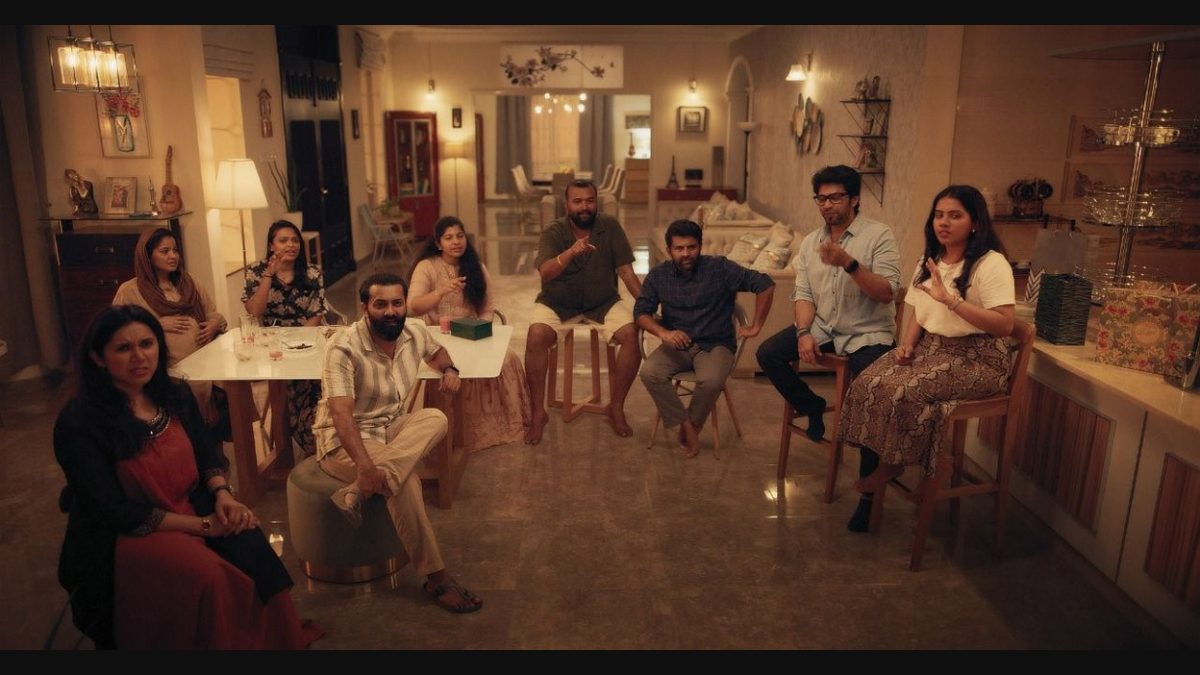A false fabrication of twisted words with alternate meanings intended to deceive someone for personal gain or what they believe to be the ‘greater good’: commonly referred to as a lie. How dangerous is a lie? Why do we, as humans, as seekers of truth and justice, resolve to lie? What are its long-term repercussions? What does lying say about the liar? While generally taught that lying is bad, it is human nature to withhold the truth in certain situations that benefit oneself and sometimes for the sake of others. Lying represents fear. Fear of loneliness, rejection, embarrassment, and judgment. Thamar’s Aayirathonnu Nunakal (1001 Nunakal, Translated to Thousand and One Lies, 2023) explores these aspects surrounding lies and secrets to raising potent questions on the sacrifice of truth involved in forging and sustaining relationships.
Thousand and One Lies (1001 Nunakal, 2023) Plot
When a fire breaks out in their apartment building in Ajman, United Arab Emirates, Rajesh, and his family seek asylum with friends Vinay and Divya, along with Mujeeb and Salma, who encounter. Upon realizing that it is Vinay’s and Divya’s 10th wedding anniversary the next day, the three couples and along with two others and a mutual friend of theirs, decide to celebrate it together. The film follows the revealing of the many secrets shared amongst the couples and the personal revelations this results in as they reinvent themselves in the eyes of each other. It becomes a cathartic release of pent-up emotions and frustrations to some extent that is distasteful at times but eventually becomes healing and introspective.
1001 Nunakal is predominantly set in a single location and therefore demands a lot more from the screenplay and individual performances to carry the narrative and keep audiences engaged. With the main characters all being played by new faces and the director himself having his debut production, there was even more pressure on the screenplay to shine through. Mostly focusing on the dynamics between heterosexual couples; some in new relationships, some old, some created through an arranged marriage, and some antithetical to even the idea of marriage, the film provides various case studies on how gendered roles arise from the intersection of tradition, class and religion.
Also, Read: 25 Greatest Malayalam Movies of All Time
For example, in the case of Rajesh and Soumya, Rajesh is unemployed while Soumya works as a nurse. This tilts the gendered power scale in favor of Soumya is, the breadwinner of the family. Rajesh feels insecure as his stereotypical role as the masculine protector of the family is subverted due to his unemployment. In another instance, the husband of the couple invests extra time and effort to shower his wife with love and affection to make up for his inability to provide her with a child.
But as the story progresses, we are informed of how it is actually the wife who is unable to bear the child and not the inability of the husband. This causes psychological turmoil and a momentary loss of trust. The film is laden with many such events. Still, it seems to forward a narrative of how all such insecurities are usual in relationships and that it is human to err but that there is an overall need to be empathetic and understanding rather than being egoistic and vengeful.
The use of 6 couples allows the film to represent various social diversities as well. Out of the 13 central characters, we are presented with various regional slangs of Malayalam ranging from Kannur, Kottayam, and Thiruvananthapuram dialects. Despite focusing on Malayalee migrants in UAE, characters represent diverse cultural and class backgrounds from their varied upbringings in Kerala, which inform their divergent sensibilities as well. For example, Joshy and Aleena, the youngest couple in Vinay’s friend circle, embody a more progressive sensibility when it comes to marriage and the role of women in a family.
Aleena, the young feminist archetype, argues for women to exercise their right to divorce in a more aggressive manner and dismiss the role of women as ‘symbols of suffering and patience.’ Such outlooks do not sit well with Salma and Soumya, who justify the institution of marriage as customary, necessary, and eternal. This polarity, in my opinion, later contributes to the plot as it translates to distrust and even borders on ageism and misogyny at times. That being the case, it cannot be overlooked that Aleena’s opinions on the role of women seem to be more informed from tweets and social media posts than from active readership and textual citations, as her opinions seem to be half-cooked and without substance.
One of the characters that stand out the most is the domestic help working at Vinay’s residence, Indhu. While the main 6 couples all seem to represent middle or upper-middle-class characters, Indhu and her husband represent the struggling lower class who, despite their best effort to stick to moral righteousness, are resolved to commit theft and lie about it in order to ensure their survival. Class hierarchies and their accompanying power structure is vividly presented in the film but in a more nuanced manner rather than being coded as black and white. This nuance comes in the form of the trust that Vinay and Divya share with Indhu and how despite their friends accusing Indhu of engaging in thievery, Vinay and Divya support her without a doubt.
Also, Read: 10 Great Malayalam Movies to Stream on Prime Video
The film remains engaging on its own with its screenplay, but what really stands out is the technical qualities, particularly the cinematography and color grading. Much of the scenes are shot in depth with the character backgrounds blurred and possessing a yellow tint which to some extent resonates with their upper-class ‘richness’. When shooting indoors, all scenes have filled compositions that emulate the material wealth that characterizes Vinay as a successful businessman in an exuberant capitalistic place like the UAE, which makes the class divide between him and Indhu all the more evident. The film, unfortunately, suffers from comparison with many films that follow a similar structure but more so from Jeethu Joseph’s recently released 12th Man (2022), which follows similar cracks in trust and friendships but presents higher stakes and therefore ends up being more gripping when it comes to plot development.
But despite this, Thamar presents an interesting slice-of-life story of how ideas of truth and lies are very subjective concepts that cannot be inherently labeled as good or bad while parallelly presenting a narrative on the intercultural experience of living in the Gulf where people from different parts of the globe coincide for sustaining a transnational existence beyond parochial boundaries of nationalism, religion, culture, and most importantly, language.



![Dogborn [2022]: ‘Venice’ Review – An Evocative Drama Rooted in Humanism](https://79468c92.delivery.rocketcdn.me/wp-content/uploads/2022/09/Dogborn-2022-Movie-Review-2-768x384.png)



